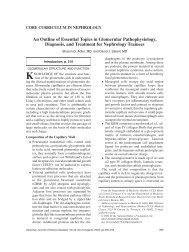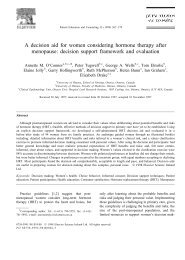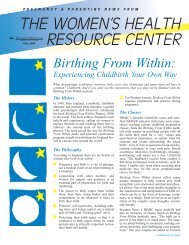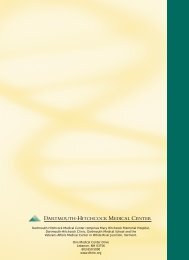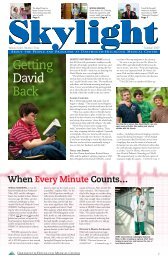Surgery and Healing in the Developing World - Dartmouth-Hitchcock
Surgery and Healing in the Developing World - Dartmouth-Hitchcock
Surgery and Healing in the Developing World - Dartmouth-Hitchcock
Create successful ePaper yourself
Turn your PDF publications into a flip-book with our unique Google optimized e-Paper software.
Tra<strong>in</strong><strong>in</strong>g of Medical Assitants <strong>in</strong> Mozambique<br />
387<br />
Only those students who pass <strong>the</strong> written, oral <strong>and</strong> practical exam<strong>in</strong>ations at <strong>the</strong><br />
end of <strong>the</strong> second year are admitted to <strong>the</strong> third year.<br />
Twelve years ago Nordberg wrote <strong>in</strong> <strong>the</strong> British Medical Journal 2 that a victim of<br />
a strangulated hernia <strong>in</strong> Africa had a 1 <strong>in</strong> 8 chance of receiv<strong>in</strong>g any surgical care, let<br />
alone of a real surgeon’s perform<strong>in</strong>g surgery. Unfortunately <strong>the</strong> situation <strong>in</strong> general<br />
has not improved s<strong>in</strong>ce <strong>the</strong>n, <strong>and</strong> <strong>the</strong>re is evidence that it has <strong>in</strong> fact deteriorated<br />
fur<strong>the</strong>r. One obvious potential emergency resolution of <strong>the</strong> problem is <strong>the</strong> delegation<br />
of major operations to health staff not formally tra<strong>in</strong>ed as medical doctors.<br />
The tra<strong>in</strong><strong>in</strong>g of nonmedical personnel to perform certa<strong>in</strong> health care tasks has<br />
long been advocated. 3 Laboratory services (<strong>in</strong>clud<strong>in</strong>g blood cross-match<strong>in</strong>g) <strong>and</strong><br />
<strong>the</strong> adm<strong>in</strong>istration of general anaes<strong>the</strong>tics can be safely delegated to nonmedical<br />
staff. It has been successfully demonstrated <strong>in</strong> parts of Africa <strong>and</strong> Assia 4-6 that tra<strong>in</strong>ed<br />
nurses <strong>and</strong> medical assistants can undertake surgical procedures. In June 1996 <strong>the</strong><br />
British Journal of Obstetrics <strong>and</strong> Gynaecology published a paper entitled “A comparative<br />
study of caesarean deliveries by assistant medical officers <strong>and</strong> obstetricians <strong>in</strong><br />
Mozambique. 7 This study of more than 2,000 consecutive caesarean deliveries showed<br />
that: (i) <strong>the</strong>re were no differences <strong>in</strong> <strong>the</strong> <strong>in</strong>dications for caesarean delivery between<br />
<strong>the</strong> two groups; (ii) <strong>the</strong> surgical <strong>in</strong>terventions associated with caesarean delivery did<br />
not differ <strong>in</strong> <strong>the</strong> two groups; <strong>and</strong> (iii) <strong>the</strong> only significant difference was <strong>in</strong> <strong>the</strong><br />
<strong>in</strong>cidence of superficial wound separation caused by haematoma, which was slightly<br />
higher <strong>in</strong> <strong>the</strong> group operated on by <strong>the</strong> assistant medical officers.<br />
The study concluded that tra<strong>in</strong><strong>in</strong>g selected medical assistants to perform caesarean<br />
delivery, even on patients <strong>in</strong> poor condition, is justified <strong>in</strong> sett<strong>in</strong>gs where doctors<br />
are scarce.<br />
The major advantage of <strong>the</strong> option we have taken is that it saves lives. On <strong>the</strong><br />
o<strong>the</strong>r h<strong>and</strong>, we acknowledge that it is an option with <strong>in</strong>creased risks for <strong>the</strong> patient<br />
under treatment.<br />
Although our experience shows that a technically safe laparotomy can be performed,<br />
<strong>in</strong> sett<strong>in</strong>gs without major surgical facilities. It is frequently more difficult.<br />
That is why we <strong>in</strong>sisted on close supervision of assistant medical officers before <strong>the</strong>y<br />
are allowed to work entirely on <strong>the</strong>ir own.<br />
Yet <strong>the</strong> delegation of major surgery to nonmedical personnel rema<strong>in</strong>s a matter of<br />
controversy. Traditional professional rules are challenged <strong>and</strong> limits of responsibility<br />
altered. There may be reasonable grounds to doubt whe<strong>the</strong>r such delegation is compatible<br />
with safety. There may be an excess of medical manpower available <strong>in</strong> some<br />
over-serviced areas of <strong>the</strong> developed world <strong>in</strong> which squabbles may result <strong>in</strong> subspecialty<br />
jealousies about who is qualified for or excluded from do<strong>in</strong>g what. In<br />
under-serviced develop<strong>in</strong>g areas, <strong>the</strong> preem<strong>in</strong>ent concern is <strong>the</strong> overwhelm<strong>in</strong>g need<br />
for health care services <strong>and</strong> <strong>the</strong> resource constra<strong>in</strong>ts that deny medical care to many,<br />
<strong>in</strong> some <strong>in</strong>stances most, of <strong>the</strong> population. Our responsibilities are first to see that<br />
services are rendered to <strong>the</strong> desperately needy <strong>and</strong> <strong>the</strong>n to upgrade <strong>the</strong> quality of<br />
those services. In this cont<strong>in</strong>u<strong>in</strong>g-crisis with <strong>in</strong>creas<strong>in</strong>g desperation brought on by<br />
presures of a burgeon<strong>in</strong>g African population liv<strong>in</strong>g <strong>and</strong> dy<strong>in</strong>g <strong>in</strong> poverty, life-sav<strong>in</strong>g<br />
expediency us<strong>in</strong>g all possible means is a more ethical medical response than professional<br />
puritanism.<br />
Although we acknowledge strong medical opposition to such developments, <strong>in</strong><br />
Mozambique we believe that <strong>in</strong> areas where <strong>the</strong>re are no doctors <strong>and</strong> people are<br />
dy<strong>in</strong>g by <strong>the</strong> thous<strong>and</strong>s for want of care, it is surely better to provide second-class<br />
health care service than none at all.<br />
37



